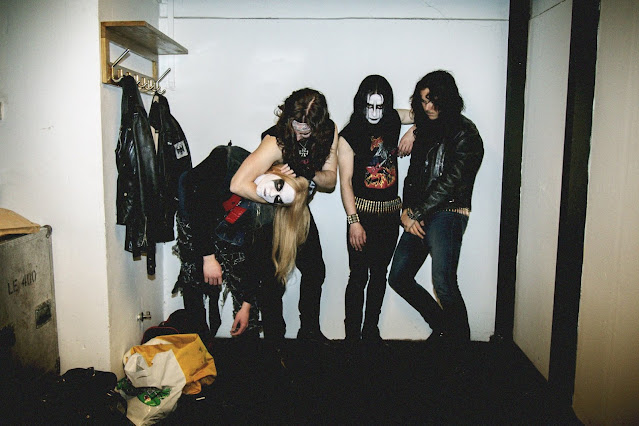Lords of Chaos (2018)
Dir. Jonas Åkerlund
As a long-time fan of early Norwegian Black Metal, I didn't know what to expect from LoC. Would it be parody, satire, mockery, or bullshit sensationalism? Wikipedia describes it as a 'horror-thriller film', which was worrying.
The answer, as I see it, is that the film is none of those things entirely, but it does lose its way as the narrative goes on. Before that, however, for about an hour of its runtime it's a pleasingly straightforward presentation with a comfortable amount of black humour and a half-decent (but mostly surface deep) depiction of the lifestyle that informed the music, and vice-versa.
It's based on the book Lords of Chaos: The Bloody Rise of the Satanic Metal Underground (1998) by Michael Moynihan and Didrik Søderlind. I've not read the text, but am familiar with how the stories were reported across Europe, firstly by having been a reader of the UK music presses at the time of the happenings — which might seem like too peripherally a connection, but is itself something that the film alludes to, in one of its most daft scenes — and later through personal research on the internet.
I'm fully aware that magazine editorials quite often disregard fact in favour of drama, but none of that really matters in this case because the film proclaims at the beginning that what's presented is 'Based on Truth.. Lies.. and what actually happened'. Apologies for stating the obvious, but it's a declaration that probably applies to every biopic that's ever been made.
Absent from media reports at the time, and what a film needs, is proper characterisation. In that respect the story focusses on three primaries, all one-time members of the band Mayhem: Øystein Aarseth / Euronymous (Rory Culkin), Per Yngve Ohlin / Dead (Jack Kilmer), and Kristian Vikernes / Varg (Emory Cohen). Euronymous is the narrator, but at various times the trio take centre stage as the story attempts to give insight into their psyche and explain their motivations.
In the order laid out above, Euronymous considers himself the leader, but is happier letting others do the work. He craves the notoriety that comes with the lifestyle, but wants to keep his hands as clean as possible. As such, he takes credit for things he didn't do, and attempts to manipulate the other band members into believing that their actions were his idea. He's not an experienced manipulator, coming across more as a somewhat half-baked opportunist.
- Dead on the left. Euronymous is second from the right.-
Dead is more interesting, but equally not someone I'd want to be close friends with. Portrayed as a fatalistic youth with some peculiar habits and an unhealthy obsession with death, he's the character that gets the least screen time of the three, but the air of mystery, cold remoteness and impenetrability that surrounds him arguably makes him the most memorable. It's maybe worth noting that acts of self-mutilation and themes of depression are explored through Dead's actions and feelings, for those that may be squeamish about such things.
Varg (aka Count Grishnackh) is characterised as a fumbling wannabe who feels he must rise to a challenge but with no concept of when to draw the line in service of it. It's an attitude that makes him the most dangerous, especially when coupled with the confused system of beliefs, ego, and asshole militaristic ideology that drives him. The scenes between he and Euronymous were probably intended to be some of the film's most powerful, but, alas, by the time Varg has become the true villain the production had crossed over into irredeemably daft territory.
The restraint that was present in the first hour is commendable, with no great reliance on horror movie camera tricks or unrealistic lighting conditions to make the characters seem more 'evil', as opposed to being just regular sociopaths, but the nightmare/haunted sequence changed that.
The idea of it was fine, but the horror-tongue was childishly stupid, marking the point where 'story integrity' ended and 'movie logic' took over. No doubt someone might argue that the 'lies' part of the disclaimer covers that kind of nonsense, and they may have a valid point, but it doesn't alter the fact that what follows that scene feels different to what came before, and a viewer's response to the difference is a key factor in what they take from the film and how they interpret the filmmaker's intentions. In my case, I feel it went to shit - a Kerrang-sized shit.
While on paper it could be described as yet another music biopic with a formulaic rise to fame followed by a fall, it doesn't feel like that too often while viewing, which is a plus point.
- Graffiti is tiring work. -




No comments:
Post a Comment